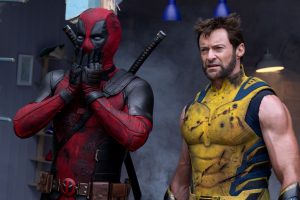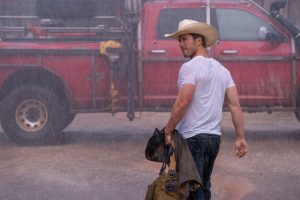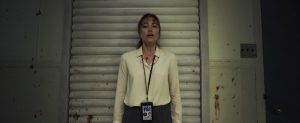Reviews include Deadpool & Wolverine, Doubles, and Mountain Queen: The Summits of Lhakpa Sherpa.
How Soon is Nigh? On Mike Leigh’s “Naked” in the Time of Corona
June 17, 2020
Friends, are you taking distance from films that confabulate with our catastrophe… or do you find yourself leaning in?
I confess to the latter. The film that’s snared my thoughts of late might be thought of as evergreen apocalyptic. Do you remember Naked? A fascinating outlier in English auteur Mike Leigh’s filmography, it was a divisive watch back upon its release in 1993 and hasn’t lost a fraught thing in the ensuring quarter-century-plus. Naked became part of the Criterion Collection in 2007 and is currently available for streaming on the Criterion Channel, where, starting June 21st, you can dig into a curated “Directed by Mike Leigh” series, which includes stand-outs such as Happy-Go-Lucky and Life is Sweet.
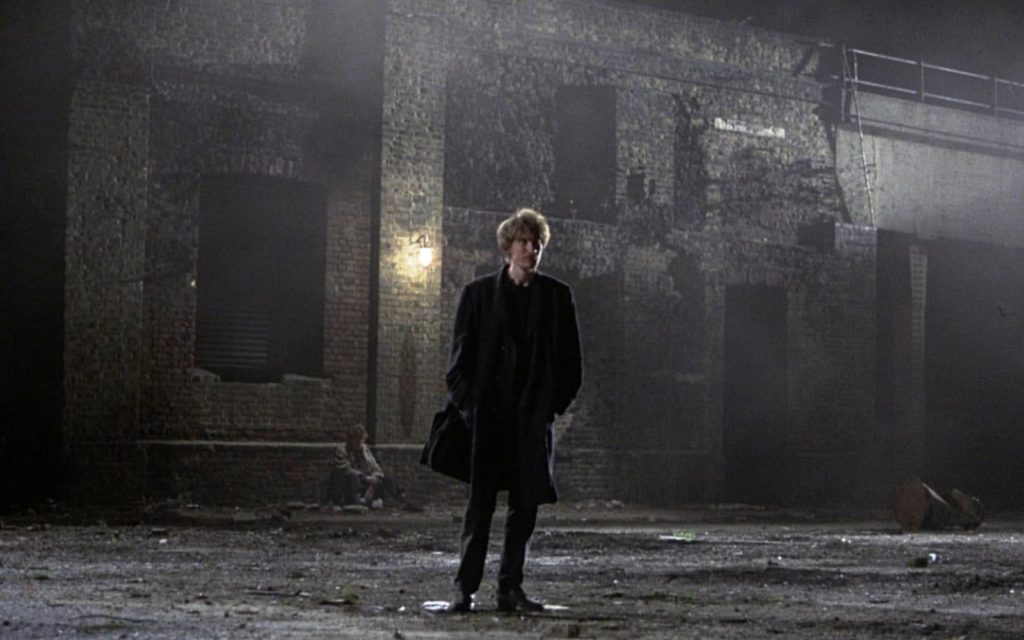
Not so sweet, Naked is a meticulously moody, darkly funny, frequently appalling film about transience, disenfranchisement, isolation, and an apocalypse so glacial as to be mistaken for business as usual: let the end times roll! And roll… And roll… Sound familiar? In one of the film’s final scenes, Sandra (Claire Skinner), a nurse returning from holiday, so flustered that finishing a sentence proves challenging, attempts to pose a question to our garrulous protagonist, a shaggy, wounded, unexpected visitor named Johnny (David Thewlis).
SANDRA: When… how… will… the world… ever…
JOHNNY: End?
SANDRA: Yes!
Set in contemporaneous, post-Thatcher era London, there’s no actual apocalyptic event in Naked, no fatal pestilence or impending asteroid or nuclear disaster. There’s only the persistent feeling of ceaseless social decay and psychic unease: alienation and loneliness have taken on the properties of a pandemic. Several of its characters display signs of acute trauma and the rest may well feel traumatized by the time the film is over. Which brings me to the trigger warning: though non-discriminatory in their nihilism, both of the central male characters in Naked enact outright hostility toward women. There are scenes of sexual harassment, unwanted sexual aggression, and outright rape that, even while applying post-#MeToo scrutiny, can be difficult to process. I can’t profess to have resolved myself to this, but neither can I talk about Naked without addressing it. Leigh is famously process-oriented, working with his actors to develop scripts through improvisation. A tireless champion for the working class, he makes films that are politicized while only occasionally didactic. But he’s never been more adventurous and less schematic than he was with Naked, which is partly why it’s as ethically chaotic as it is bleakly thrilling.
It was Leigh’s intention to open the film with a scene that shows Johnny in the worst possible light: mission accomplished! The camera scrambles down a narrow street until it nearly pounces upon Johnny having rough sex with a woman against a brick wall illuminated only by the jaundiced glow of a street lamp. From what little we can ascertain, things may well have begun consensually — the script reads: At first, the WOMAN seems enthusiastic — but rapidly tilts toward violation with the woman’s cry of “You’re hurting me!” She manages to break away from Johnny, assuring him that some guy named Bernard — her pimp? — is going to exact revenge. Johnny flees, with the camera in jagged pursuit. Johnny fetches a shoulder bag from his flat, steals a car— after tossing a stroller from its trunk: a nice touch — and drives through the night to London. We were, we will learn, in Manchester.
Naked is not a plot-driven movie, but it is rich in complex characters and charged with ambient doom. Johnny ditches his ride and hoofs it to the flat of Louise (Lesley Sharpe), an ex-girlfriend and fellow Mancunian. With Louise at work, Johnny spends the day with Loise’s utterly endearing hot mess of a flatmate Sophie (the late, great Katrin Cartlidge). Delivering lines as though Sophie’s jaw’s been wired shut, Cartlidge gives a virtuosic performance that’s by turns hilarious, harrowing and heartbreaking, before going back to hilarious. Johnny and Sophie, the pair of them rake-thin and dressed exclusively in black, fancy each other enough to ensure some hours of wisecracks and happy sex before things descend into grumpiness (Johnny’s), neediness (Sophie’s) and nasty sex (which Johnny perpetrates against Sophie). Between the happy and the nasty, Louise comes home, but things between she and Johnny are tense, owing, seemingly, to a stormy history as much as to the fact that Louise is the one person in this film that seems to really understand Johnny — and can give back what he puts out in terms of acidly clever verbosity. Eventually Johnny flees Louise’s flat and Naked becomes something of a nocturnal picaresque in which Johnny assails one stranger after another with esoteric, scientific and religious evidence to prove that humanity is surely living its Last Days. Among Johnny’s many memorable encounters is one with an agitated, lost, likely Tourettic Scotsman named Archie (Ewan Bremner), “a wonderful exponent of the old Socratic debate,” whose girlfriend (Susan Vidler) later reveals to be illiterate.
Running parallel to Johnny’s story is that of Jeremy (Greg Cruttwell), an affluent twat we first meet, appropriately enough, at the gym, wearing a starched polo shirt while working the bench press, his facial expression conveying his customary contempt. We see Jeremy callously proposition an RMT — if you call a man asking a woman if women like to be raped a proposition — and, later, deploy self-loathing as foreplay, announcing his intention to suicide at the age of 40 before launching into brutal intercourse with an unsuspecting lover. Jeremy, the most aberrant and, perhaps mercifully, least developed of Naked’s major characters, does eventually cross paths with Johnny. That their intersection ends with Johnny a shambles and Jeremy driving off in his sportscar is the closest Naked comes to spelling out Leigh’s feelings about class and accountability.
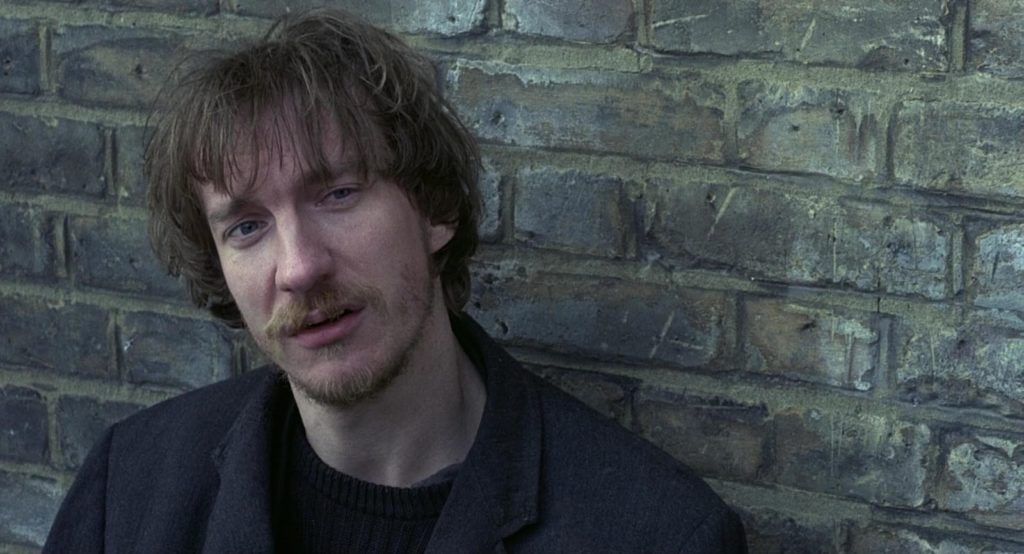
We all know protagonists needn’t be likeable, but what makes Johnny so troubling is that, for some of us at least, he is likeable. This is due in part to Thewlis, who commandeers the character’s charismatic quicksilver quips with savant-like mastery: how this role failed to secure Thewlis a career on par with peers such as Tim Roth or Gary Oldman remains a mystery to me. But Johnny’s appeal is also built into his conception: at once a Groucho and a Harpo, he’s both a gifted colour commentator and a rabid, horny mischief-maker. He takes genuine interest in others, even if he’s also constantly taking the piss. He asks people questions, even if he might turn their response into a gag. Even in his conversation with Brian (Peter Wright), a night-watchman upon whom he conducts his most extensive rhetorical ambush, we can see that Johnny is clearly curious, seeking real engagement. It’s in these dialogues with strangers, especially the one he shares with an achingly inward, mercurial café waitress (Gina McKee), that we see a patience and tenderness in Johnny to match his feverish aggression and occasional outright cruelty. But Johnny seeks erotic validation from every woman he meets — and he knows how to spot the loneliest ones, not only because they’re the most vulnerable but also because they’re the most like him. There are allusions to Johnny’s mother being promiscuous, neglectful and possibly abusive, which is the closest thing to a clue regarding the origins of Johnny’s knee-jerk misogyny that we’re given. Leigh wisely resists overemphasizing this element in Johnny’s background, lest it be mistaken for explanation or apologia.
Johnny also benefits from being inevitably compared to Jeremy, a charmless predator who displays not a sliver of compassion, or even curiosity, for anyone. You have to wonder if Jeremy’s main purpose in the film is exactly this: to be Johnny’s evil doppelgänger and make Johnny look better. It’s worth noting that while operating as a despairing dual case study in male pathology, Naked does in fact pass the Bechdel Test, with a lovely scene that finds Sophie and Louise taking refuge from home invasion at a local bar. To be sure, they speak of their experiences with men, but their conversation isn’t about those men — it’s about what it means to endure and interpret experiences of intimacy gone terribly awry. (Leigh must have recognized that he had the seed of something special in that scene: he cast Cartlidge again in the buddy movie Career Girls just a few years later.)
What to do with Naked? To love the film is certainly not to advocate for its protagonist’s actions or world view, but it’s hard to express appreciation for this film without holding its horrors to account. Naked closes with a gesture that echoes Five Easy Pieces: not unlike Jack Nicholson’s Bobby Dupea, Johnny, though offered a chance at redemption, seems tethered to a personal modus operandi that leaves him no recourse but, once again, to flee. I would guess that intimacy, in his experience, equals betrayal, so better to be the betrayer than the betrayed.
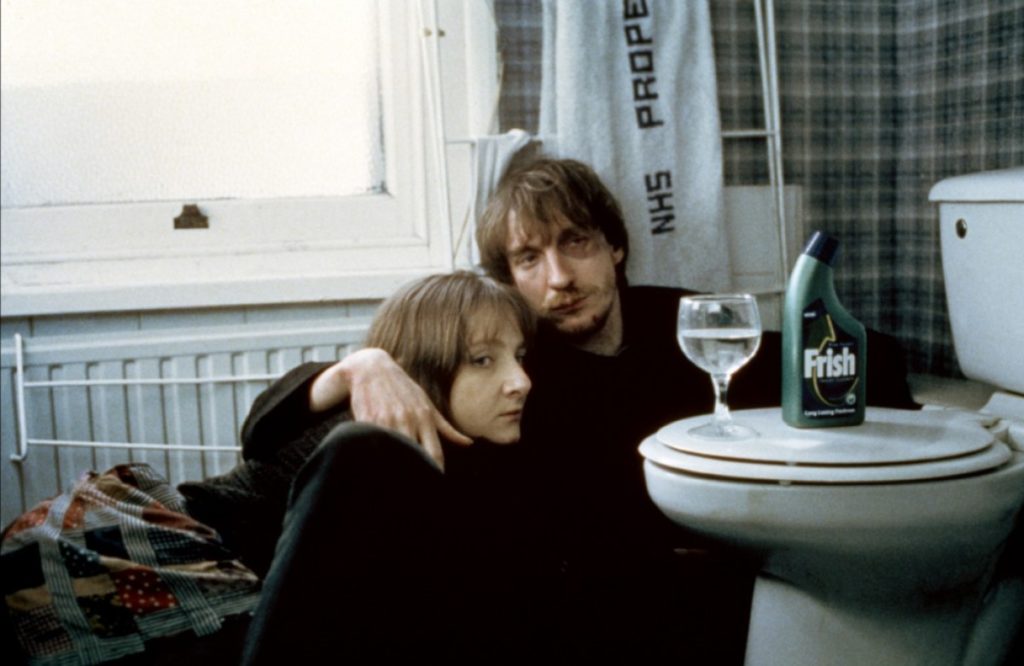
Between Alison Chitty’s production design, Lindy Hemming’s costumes and Dick Pope’s photography, Naked is a strong contender for the greyest colour film in cinema history, yet its bleakness is also beautiful, featuring countless images in which skin, fabric, concrete, smoke and shadow are strikingly contrasted: behold the stunning, Stalker-esque sequence that unfolds in a disused rail station. The singular tone of Naked, too, is generated through contrasts, with dazzlingly witty banter—“What are you doing here? You look like shit.” “Just trying to blend in with the surroundings.”—cascading in tautly edited exchanges and brilliantly juxtaposed with Andrew Dickson’s relentless score for harp and string quartet, with its eerily buoyant balance of delicacy, foreboding and momentum. The net effect of this confluence of elements is an atmosphere we might dub screwball horror—the film is only ever an inch away from being a flat-out comedy. Naked’s aesthetic peak is arguably the aforementioned scene between Johnny and night-watchman Brian, that vision of two men in a vast empty room in a vast empty building, both bathed in penumbra and shot from an audacious distance, the music fretting away as Johnny launches a quasi-evangelical verbal assault, weaponizing fragments of Darwin, Stephen Hawking, Nostradamus, chaos theory and the Book of Revelation in an effort to pulverize Brian’s optimism. The whole thing is captured in an almost perversely counterintuitive manner and may be the single-most bravura sequence in Leigh’s oeuvre.
As we endure the pandemic and its accompanying economic, social and mental-health crises in solitude — or pretend there’s no pandemic and frolic thoughtlessly in hordes — perhaps we are all of us staging a Johnny-Brian summit conference in our souls, the one voice declaring the end to be nigh, the other claiming there’s nothing to see here. The truth, we all know, lies somewhere between. Just let’s not forget that Johnny and Brian’s encounter closes with the latter giving some prosaic yet undeniably sagely advice to the former. “Don’t waste your life,” Brian says, blindsiding Johnny without even making eye contact. Watching Naked today comes with a message: pay close enough attention and you’ll see that things are always falling apart. The question that follows is: what are you going to do about it?

